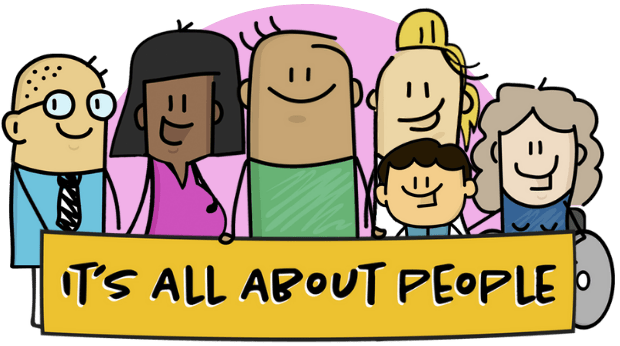Co-producing services together
Co-production brings together people who deliver services, with people who use their services to make things better for all.
For those working in health, care and the voluntary sector, co-production may be a new way of working, but people with lived-experience, bring a unique perspective to any piece of work. Care to join us?
The value of a co-production approach has been explored in a range of settings from social care, health and the voluntary sector and evidence suggests that it is an excellent approach to creating positive outcomes for people through more person-centred design and delivery of services.
In recent years, Lincolnshire has invested in developing co-production groups, sharing learning and valuing the impact of co-produced work as part of embedding personalised approaches to health and care.
Co-production aims to support people with lived-experience to have the skills, knowledge and confidence to work with those from within the system as equal partners.
Whilst recognising that you can’t co-produce everything, by identifying areas of mutual importance people, can work together to improve services for all.
By bringing the relevant parties round the table at the earliest stage, a real difference can be made.
To embed co-production across the county we need to:
- Truly embrace the value of people with lived-experience and the difference they can make.
- Build co-production in from the start and not as an after-thought.
- Know the difference between co-production, co-design and other forms of engagement.
- Be patient – it is not a quick win and is not always easy, but it is a valuable part of getting things right.
- Be brave – it will feel uncomfortable.
In the video below Vicky Thompson, Chief Executive - Every-One, talks more about the importance of good co-production to health and social care organisations and the added value it can bring.
Please click on the sections below to find out more.
Work to date
There are already a range of co-production groups working in Lincolnshire which include:
Lincolnshire Strategic Co-production Network
Supporting the personalisation agenda in Lincolnshire across health and social care.
Lincolnshire Macmillan Cancer Co-production Group
Supporting the living with cancer programme.
Social Prescribing Co-production Group
Supporting the development of new technology such as Vitrucare for social prescribing.
Lincolnshire Mental Health Co-production Group
Supporting the Lincolnshire Community Mental Health Transformation Programme.
Atrium Co-production
Supporting the development of the Atrium portal for health and social care.
Lincolnshire Palliative / End of Life Co-production – under development.
How you can use co-production?
Working with a co-production group on the right things, at the right time, will add quality to your project. It will challenge your thinking and practices in a positive way and identify new ways of working.
Think about your own barriers to co-production
Are you under tight deadlines? Don’t want to lose control of your work? Worried about confidentiality?
How co-production has helped other professionals
“It helped to challenge professionals thinking and ensure recommendations and future direction was based on what matters to people with personal experience”
“Embrace it as working together is so rewarding, bringing a different perspective and as a professional you may feel it takes longer but the outcome is worth it.”
"Co-production is so much more than patient and public involvement! It offers individuals and groups a chance to inform, collaborate and truly be a part of projects/research/services from the beginning to the end.”
"It's truly made me realise that, as services, we need to constantly be stepping back and looking at whatever we do through the lens of our service users. But, beyond that, if we're not engaging our 'patient experts' then we're leaving ourselves blind to perspectives that are so critical to how we create and improve services.”













